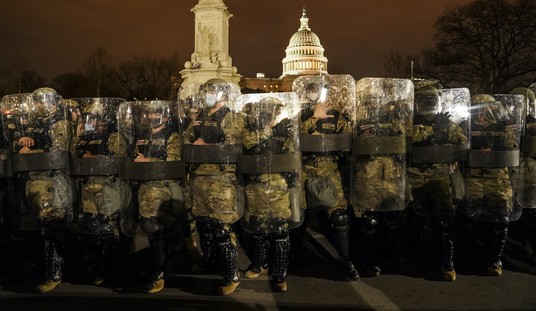
One of the evils of the criminal justice system that we at RedState have editorialized against over the years is civil asset forfeiture. This Orwellian process involves law enforcement confiscating property they allege to be the product of a crime without the inconvenience of either specifying the crime, charging a criminal, or even showing that a crime happened. This is from Heritage Foundation’s Civil Asset Forfeiture: 7 Things You Should Know:
Civil asset forfeiture is a legal tool that allows law enforcement officials to seize property that they assert has been involved in certain criminal activity. In fact, the owner of the property doesn’t even need to be guilty of a crime: Civil asset forfeiture proceedings charge the property itself with involvement in a crime. This means that police can seize your car, home, money, or valuables without ever having to charge you with a crime.
…
…Unfortunately, civil asset forfeiture is also used by law enforcement as a way to generate revenue, and many of its targets are innocent members of the public.
…For example, between 2006 and 2008, law enforcement agents in Tenaha, Texas, engaged in a systematic practice of seizing cash and property from innocent drivers with absolutely no evidence of wrongdoing. In Philadelphia, police seized the home of two sisters whose brother, who did not live there, showed up while trying to evade the cops. In Detroit, cops seized over a hundred cars owned by patrons of an art institute event—because the institute had failed to get a liquor license.
The Daily Caller has a great list of classic abuses of civil asset forfeiture. And this is a great video by Heartland Institute on the problem.
Despite former Attorney General Jeff Sessions’ deep and abiding romance with taking people’s stuff on a whim, the tide seems to be turning. Back in December, the Supreme Court heard a case challenging civil asset forfeiture. This is an excerpt from my post, Civil Asset Forfeiture May Be Limited By The Supreme Court In A Very Unusual Case.
{Marion] Timbs suffered a foot injury and, as with so many other people, the use of legal hydrocodone to suppress pain smoothly transitioned from a medical need to addiction. One of his dealers way out of hydrocodone when Timbs showed up to buy and was persuaded to try heroin instead. Needless to say, Timbs developed a taste for the substitute and became a junkie. According to court records, he managed to clean himself up for a short while but persistent unemployment drove him back to drugs. The only good luck he had was that about the time of his relapse in 2015, his father died leaving him $73,000 in life insurance proceeds. Timbs used $42,000 to buy a used Land Rover and soon burned through the remainder. He looked around for ways to fund his addiction and an acquaintance, who moonlighted as a police confidential informant, connected Timbs with heroin dealers who set Timbs up as a franchisee.
His career as a pharmaceutical entrepreneur lasted two weeks. During that time he made two sales to undercover narcotics officers–for $225 and $160, respectively–while he was heading off to a third sale…also to narcs…he was arrested and charged with two counts of selling heroin and one count of conspiracy to commit theft. His Land Rover was seized on the spot.
A trial court judge ordered the Land Rover returned as it was clearly bought with proceeds from a life insurance policy and it was excessive. The Indiana Supreme Court ruled that that silly old Eighth Amendment had never been incorporated, that is, made applicable to the states and because of that, the Indiana cops could do as they damned well pleased.
At the Supreme Court arguments, it was pretty clear that Indiana was on very unsteady ground with five justices very skeptical about the state’s arguments. No one knew just how skeptical the Supreme Court was until earlier this morning:
The Supreme Court ruled unanimously Wednesday that states may not impose excessive fines, extending a bedrock constitutional protection but potentially jeopardizing asset-forfeiture programs that help fund police operations with property seized from criminal suspects.
“For good reason, the protection against excessive fines has been a constant shield throughout Anglo-American history: Exorbitant tolls undermine other constitutional liberties,” Justice Ruth Bader Ginsburg wrote for the court. “Excessive fines can be used, for example, to retaliate against or chill the speech of political enemies,” she continued, citing examples from English history tracing to the Magna Carta.
The court also held that the Eighth Amendment did, indeed, apply to the states. This is the decision.
As the guys at Reason said, between puffs on a post-coital cigarette, this will be far-reaching in its effects and will go beyond civil asset forfeiture:
Indeed, some local governments do use fines and fees as a means to raise revenue, and that has created a perverse incentive to target residents. After the 2014 shooting of Michael Brown in Ferguson, Missouri, a federal investigation into the city government found that 20 percent of its general fund came from criminal fines. And Ferguson is not alone in relying heavily on revenue from fines. Making clear that the Eighth Amendment applies to the states will make it far easier to challenge unreasonable fines and fees—including not just asset forfeiture cases, but also situations where local governments hit homeowners with massive civil penalties for offenses such as unapproved paint jobs or Halloween decorations.
Some of those cases are already getting teed up. As C.J. Ciaramella wrote in this month’s issue of Reason, a federal class action civil rights lawsuit challenging the aggressive asset forfeiture program in Wayne County, Michigan, that was filed in December argues that the county’s seizure of a 2015 Kia Soul after the owner was caught with $10 of marijuana should be deemed an excessive fine.
More broadly, Timbs is a good reminder of how ridiculous the argument in favor of civil asset forfeiture really is. During oral arguments in November, Indiana’s solicitor general got boxed into a corner by Justice Stephen Breyer, who managed to twist the government’s lawyer into arguing that Indiana should be allowed to seize vehicles for as small an offense as driving 5 mph over the speed limit, which literally elicited laughter in the courtroom.
It is hard to overstate just how important this ruling is. It clearly sets the groundwork for successful attacks on civil asset forfeiture everywhere. The fact that the decision is 9-0 means there is limited ability to skirt it. Now it is a matter of time until it simply becomes too expensive for law enforcement agencies to engage in an action that is guaranteed to land them in court with a very, very weak hand.
=========
=========
Like what you see? Then visit my story archive.
Follow @streiffredstate
I’m on Facebook. Drop by and join the fun there.
=========
=========














Join the conversation as a VIP Member